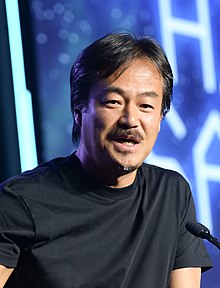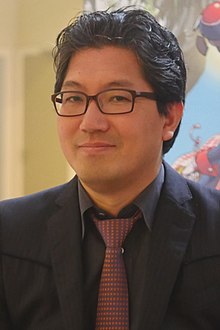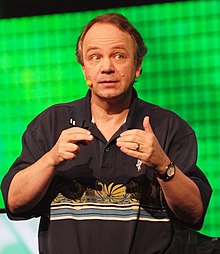Portal:Video games
The Video Games Portal

A video game or computer game is an electronic game that involves interaction with a user interface or input device (such as a joystick, controller, keyboard, or motion sensing device) to generate visual feedback from a display device, most commonly shown in a video format on a television set, computer monitor, flat-panel display or touchscreen on handheld devices, or a virtual reality headset. Most modern video games are audiovisual, with audio complement delivered through speakers or headphones, and sometimes also with other types of sensory feedback (e.g., haptic technology that provides tactile sensations). Some video games also allow microphone and webcam inputs for in-game chatting and livestreaming.
Video games are typically categorized according to their hardware platform, which traditionally includes arcade video games, console games, and computer (PC) games; the latter also encompasses LAN games, online games, and browser games. More recently, the video game industry has expanded onto mobile gaming through mobile devices (such as smartphones and tablet computers), virtual and augmented reality systems, and remote cloud gaming. Video games are also classified into a wide range of genres based on their style of gameplay and target audience. (Full article...)
Featured articles –
Lightning was created by Motomu Toriyama, the director and scenario writer of XIII, and designed by regular Final Fantasy artist Tetsuya Nomura. The design goal was a character who was less feminine than previous Final Fantasy heroines in both appearance and personality. Aspects of her early design and personality were later altered, or transferred to other characters. After XIII, Lightning's design was revised several times to reflect her role and development in each game, particularly in Lightning Returns. Her real name in Japanese, Éclair Farron, was originally a placeholder. Because of her first name's association with a type of pastry, it was changed to "Claire" in other countries.
Lightning has received mixed commentary from critics—much of it relating to her cold personality, which was compared to that of Final Fantasy VIIs protagonist Cloud Strife. She was criticized for her relative absence in XIII-2. Her role in Lightning Returns met with mixed reception: some critics saw her as underdeveloped and unlikable, while others found her better developed and more human than in previous games. Lightning later appeared on lists, compiled by video game publications, of the best characters in the Final Fantasy series and in video games as a whole. She has been received favorably in polls of public opinion by Famitsu, Square Enix, and other organizations. ('Full article...)
Narratively, the player is separate from the protagonist, Niko. The latter arrives in a world without sunlight and aims to restore it by replacing its sun, a lightbulb, at the top of a tower. OneShot was developed in RPG Maker XP. The game received positive reviews from critics, who praised the story, art, and metafictional aspects of gameplay, including the relationship between the player and Niko. In 2017, the game was nominated for the "PC Game of the Year" category at the Golden Joystick Awards. (Full article...)
Pathways began as a sequel to Bungie's Minotaur: The Labyrinths of Crete, before the developers created an original story. Jason Jones programmed the game, while his friend Colin Brent developed the environments and creatures. The game features three-dimensional, texture-mapped graphics and stereo sound on supported Macintosh models. Pathways was critically acclaimed and won a host of awards; it was also Bungie's first major commercial success and enabled the two-man team of Jason Jones and Alex Seropian to move into a Chicago office and begin paying staff. (Full article...)
Did you know... -
- ... that the illustrations in the 1992 video game Tetris Classic are based on scenes from Alexander Pushkin's poem Ruslan and Ludmila?
- ... that deceased YouTuber Technoblade beat the video game Minecraft in hardcore mode using a racing-wheel controller?
- ... that the game designer of the video game Hades said that the characters were attractive "because Jen Zee"?
- ... that a cheat code in the video game Spyro: Year of the Dragon grants access to a near-complete copy of Crash Bash?
- ... that a version of the video game Rhino Rumble was not released due to the creators not wanting to add licensed characters?
- ... that Elena from the video game series Street Fighter uses a capoeira fighting style, for which the development team used travel videos as reference material as they had no experience with the style?
- ... that the European version of the video game Tomba! uses the theme song of the television series No Sweat as its opening theme?
- ... that the case Lewis Galoob Toys, Inc. v. Nintendo of America, Inc. was considered essential to the future of video game modding in the United States in 1992?
- ... that the 2015 video game Worlds of Magic, intended as a spiritual successor to the classic game Master of Magic, failed to impress most reviewers?
- ... that the 1979 video game Superman was one of the first console games with a pause feature?
- ... that Kamibox's video game A Joke That's Worth $0.99 is permanently on special offer because Itch.io does not allow $0.99 as a regular price?
- ... that Rawson Stovall became the first nationally syndicated video game journalist in the United States when he was only eleven years old?
Selected biography –
Selected image -
- April 16, 2024 – 2023–2024 video game industry layoffs
- American video game company Take-Two Interactive lays off 5% of its workforce. (Reuters)
- April 10, 2024 – 2023–2024 video game industry layoffs
- American video game company Epic Games announces that it will lay-off around 870 employees, roughly one-sixth of its workforce, due to slower growth than expected. (CBC via Yahoo! News)
- December 22, 2023 –
- China passes a series of regulations aimed at limiting video game microtransactions. The new rules include banning rewards for logging on for multiple consecutive days and banning rewards for players if they spend money in a game for the first time. (Reuters)
Topics
Categories
Things you can do
In other Wikimedia projects
The following Wikimedia Foundation sister projects provide more on this subject:
-
Commons
Free media repository -
Wikibooks
Free textbooks and manuals -
Wikidata
Free knowledge base -
Wikinews
Free-content news -
Wikiquote
Collection of quotations -
Wikisource
Free-content library -
Wikiversity
Free learning tools -
Wiktionary
Dictionary and thesaurus















































